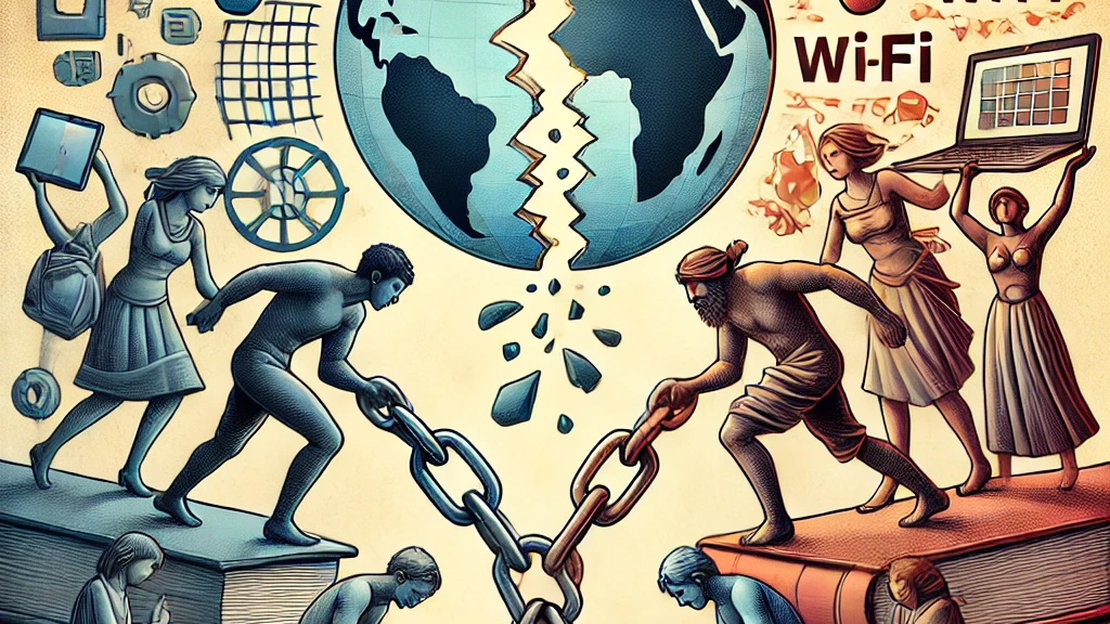Breaking the Chains of Modern Inequalities: Alphabetism, Internet Access, and Digital Literacy
In the twenty-first century, access to information, connectivity, and digital tools are critical to individual success and societal growth. Yet, despite technological advances and widespread communication networks, many people remain excluded due to modern forms of inequalities. Let’s explore three primary barriers: alphabetism, lack of internet access, and digital illiteracy—each representing different levels of exclusion and the limitations they impose on millions around the globe.
Level One: Alphabetism — The Foundation of Understanding
Alphabetism, or the inability to read and write, is the most fundamental form of exclusion. In many parts of the world, illiteracy limits personal development and access to opportunities. Without the ability to read or write, individuals are deprived of the basic means to communicate, learn, and navigate the world. Alphabetism restricts people’s ability to participate in society, perpetuating cycles of poverty and marginalization.
While global literacy rates have improved, with more children receiving basic education than ever before, illiteracy still affects nearly seven hundred and seventy-three million adults worldwide. This first level of inequality creates barriers to further learning and employment, making it nearly impossible for individuals to break out of poverty or advocate for themselves.
Level Two: Lack of Internet Access — The Digital Divide
The second level of inequality is defined by access—or rather, the lack thereof—to the internet and digital technologies. Known as the digital divide, this disparity separates those with internet access from those without. In an increasingly connected world, lack of internet access excludes individuals from participating in the global economy, limits educational opportunities, and restricts access to essential services.
According to recent statistics, around two-point-seven billion people, or about one-third of the global population, still do not have access to the internet1. This gap exists not only in developing regions but also within developed countries, affecting rural areas, low-income communities, and marginalized groups. Without internet access, individuals miss out on job opportunities, digital learning, and even basic social interactions that are now predominantly online.
Level Three: Digital Illiteracy — The Skills Gap of the Future
The third level of exclusion, digital illiteracy, refers to the lack of skills and knowledge required to effectively use the internet and digital tools. Even among those with internet access, many lack the digital literacy needed to leverage technology for education, employment, or personal development. This skills gap hinders participation in the digital economy, making it difficult to navigate online platforms, assess the credibility of information, and utilize digital resources productively.
Digital illiteracy is often intertwined with alphabetism and lack of internet access, creating a vicious cycle of exclusion. For example, a person who cannot read or write may struggle to use digital devices, and without access to the internet, they cannot develop digital skills. Addressing this issue requires targeted education programs and policies that prioritize digital literacy alongside traditional literacy and internet accessibility.
Breaking the Cycle: A Call for Comprehensive Solutions
Addressing these three levels of inequality—alphabetism, lack of internet access, and digital illiteracy—requires a holistic approach:
1. Promoting Universal Literacy: Invest in education programs to eliminate alphabetism and ensure every individual can read and write, creating the foundation for further learning and empowerment.
2. Bridging the Digital Divide: Expand internet infrastructure and provide affordable connectivity to underserved communities, enabling equal access to information and opportunities.
3. Building Digital Literacy: Develop training programs to equip people with the digital skills they need to thrive in an increasingly digital world. From basic computer usage to navigating online platforms and understanding cybersecurity, digital literacy must be a priority in education systems worldwide.
These steps will not only help individuals overcome barriers to personal growth but also contribute to a more inclusive and equitable society. The path forward involves not just connecting people to the internet but empowering them with the tools and knowledge to fully participate in the digital age.
The reality is that each form of exclusion feeds into the next, creating a compounding effect that is hard to break without deliberate intervention. By focusing on literacy, connectivity, and digital skills simultaneously, we can build a future where no one is left behind—where access to information and opportunity is a universal right, not a privilege.
The barriers of alphabetism, lack of internet access, and digital illiteracy are not just issues of the past or of underdeveloped regions—they are global challenges that require our collective attention and action.
⚠️ Please take a look at the LLM Disclaimer
